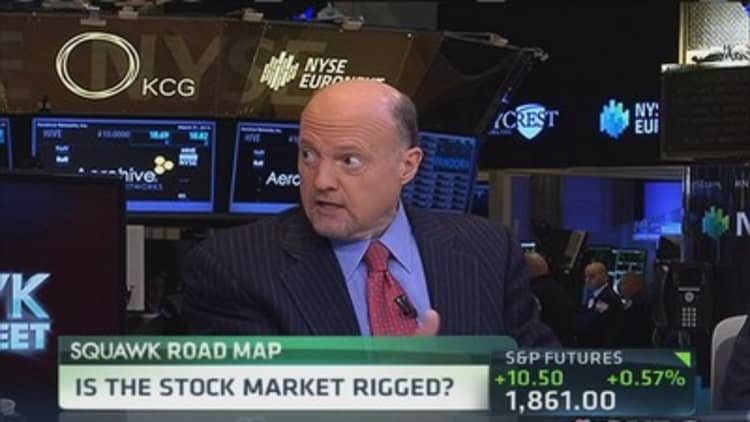
Wall Street was a buzz Monday over comments by Michael Lewis, the best-selling author of "The Big Short" and "Moneyball," who alleges the stock market is "rigged" by high-frequency traders.
On CNBC's "Squawk on the Street," Jim Cramer gave credence to Lewis' critique of high-speed, electronic trading—but stopped short of calling the market "rigged."
"I don't want to use the word 'rigged' because that's an explosive term, but short term, ... there are a lot of people who are able to get ahead of others in an order and then take advantage of their speed," Cramer said. "If that is rigging, then it is true."
Lewis, whose latest work is called "Flash Boys: A Wall Street Revolt" was published Monday, alleges that high-frequency traders are able to buy stocks ahead of most investors, and then sell those shares at a much higher price.
Read MoreMichael Lewis and why the stock market is 'rigged'
"It all happens in infinitesimally small periods of time. There's speed advantage that the faster traders have, ... some of it is fractions of milliseconds," Lewis said in an interview broadcast Sunday on CBS' "60 Minutes. "But it's enough for them to identify what you're going to do and do it before you do it at your expense."
In turn, Lewis charged that firms who execute these electronic trades have been able to siphon billions of dollars out of the market.
SEC spokesman John Nester declined to comment on the book, but noted that "The staff, at Chair [Mary Jo] White's direction, is conducting a comprehensive data-driven analysis of a range of market structure issues, including high frequency trading practices and their impact on the fairness, efficiency and integrity of our markets."
It remains to be seen what action regulators will take following the release of Lewis' book, and what impact it will have on investor confidence.
Read MoreNew York to probe high-frequency trading
Several market observers on Monday said it was interesting high-frequency trading was gaining widespread attention, since these trades are nothing new. High-frequency trading likely caused the flash crash of May 2010, for example, when the Dow lost nearly 1,000 points in a matter of minutes, Cramer said.
Jack Ablin, executive vice president and chief investment officer at BMO Private Bank, told "Squawk on the Street" he hopes a regulatory investigation will spark changes because high-frequency trading is just a "chip away at the underpinnings of confidence in the system."
Cramer thinks high-frequency trading will likely continue though, because it provides the exchanges another source of revenue, and regulators are apathetic on the issue.
Harry Clark, founder of Clark Capital Management, said a lack of outrage on the issue will likely mean little-to-no changes.
"I don't think the public gives a darn. The public doesn't care if someone makes an extra penny a trade, in my opinion. Professionals do. The traders do," Clark told CNBC. "I think it will have no effect on public psychology whatsoever."
—By CNBC's Drew Sandholm with Reuters. Follow him on Twitter @DrewSandholm.


